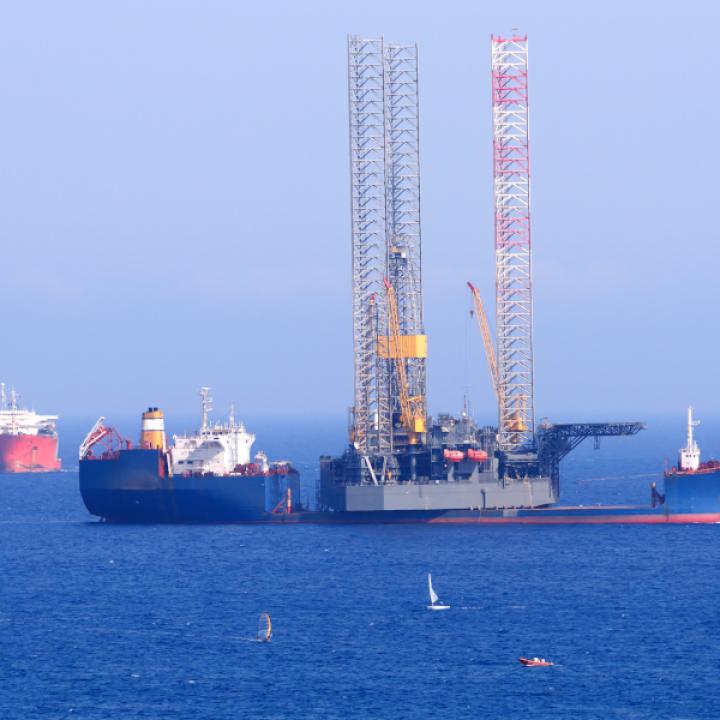
- Policy Analysis
- Policy Alert
Increased Drilling Raises Hopes for East Mediterranean Natural Gas Production

Activity in Cyprus and Lebanon could have significant implications for regional energy and diplomacy.
In late April, drilling began in the Aphrodite gas field, located in Cyprus’s exclusive economic zone (EEZ), the first such activity since the field was discovered in 2011. The delay can be attributed to the comparatively small size of the field (4.5 trillion cubic feet), the great depth of the water in which it lies (around 6,000 feet), and the lack of resolution regarding an Israeli company’s claim to part of the field because it extends into Israel’s EEZ.
The new drilling is intended to delineate the gas reservoir so that it can be exploited efficiently. Rather than pumping the gas to Cyprus itself, a hundred miles to the north, current plans are to send it via a seabed pipeline to Egypt, where it can be liquefied and loaded onto special tankers and thereafter exported anywhere in the world. The domestic market in Cyprus is too small to take any more than a fraction, but recent higher prices for natural gas make developing the field an attractive proposition.
The costs involved in developing Aphrodite are huge. Drilling in deep water to reach gas several thousand extra feet below the seabed costs around $100 million and will take three months. Laying a pipeline from Aphrodite to Egypt would involve the further expenditure of several hundred million dollars. An alternative option might be a specialized floating liquefied natural gas (LNG) vessel anchored above the field and directly loading onto tankers, but the capital costs involved—perhaps $2 billion—argue against viability for a field this size.
Lebanon’s Qana Prospect
Drilling is also expected to start in September in the potential Lebanese gas field north of the Lebanon-Israel maritime border in Block 9, and perhaps stretching southward into Israel’s EEZ. Last year’s U.S.-brokered agreement by which the France-based TotalEnergies pays royalties to Israel for any gas discovered theoretically provides a workaround given the continuing lack of formal diplomatic relations between the neighbors. The possibility, perhaps even likelihood, that the Qana field contains no gas, or not in commercial quantities, will be its own major political challenge.
Gas in Gaza
On May 4, an Israeli television channel broadcast a news story suggesting that Israel may allow the exploitation of Gaza Marine, a comparatively small Palestinian gas field (1 trillion cubic feet) off the Gaza coast, if Hamas releases the bodies of Israeli soldiers killed in fighting several years ago. The gas, the report said, could be exported via subsea pipeline to join up with an Egyptian pipeline. This is a particularly speculative possibility because the Gaza Marine field belongs to the Palestinian Authority rather than Hamas, which controls Gaza. Previous reports suggest the most viable step forward would be planning for the gas to be processed in Israel and then pumped back into the Gaza Strip, where the only power station is actually designed to use gas as fuel. Problems involve the high cost of developing the field—about $1 billion—and commercial doubts because Palestinian households may not want to pay, and would not accept being cut off for nonpayment.
Discounting the flurry of headlines about Gaza Marine, also affected by the latest clashes involving Israel, Hamas, and Palestinian Islamic Jihad, efforts in the Aphrodite field and the Qana prospect should be seen as reflecting heightened interest in East Mediterranean natural gas. Once largely ignored by major exploration companies, the region—extending into western Egypt both onshore and offshore—is now a hive of activity. The likelihood of additional discoveries will not create a rivalry with the Persian Gulf in hydrocarbon riches, but such discoveries are still significant in both energy and diplomatic terms.
Simon Henderson is the Baker Fellow and director of the Bernstein Program on Gulf and Energy Policy at The Washington Institute.



